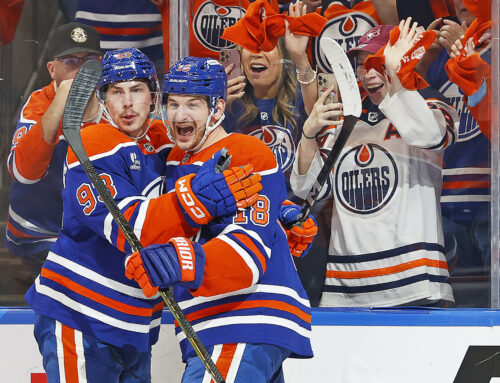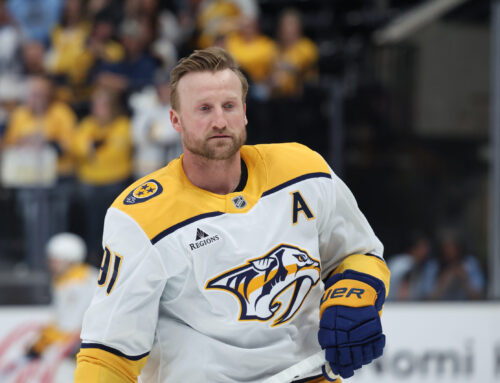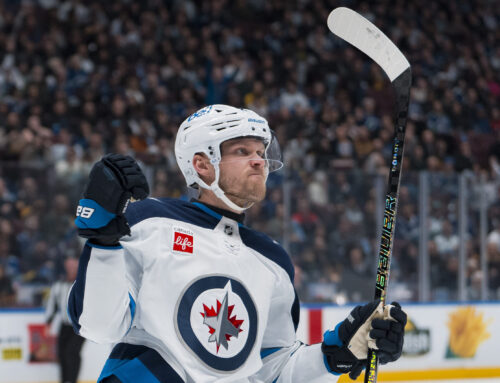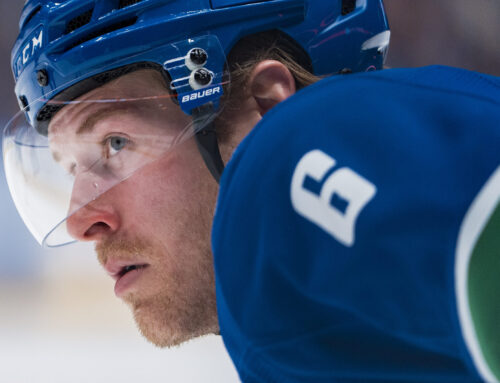
Six players in the Western Conference poised for a breakout season…
Picking a breakout player can be a huge boon for a fantasy hockey team as it is the epitome of buying low and maximizing return on the value of a player. At almost no other time, other than a major rebound season, a fluke season or Vinny Prospal in an odd year, can you expect to get a similar boost in value. Players in a breakout season can go from being second- or third-line players to legitimately offering up first-line value. There is a dearth of traditional breakout candidates in the West this year so this column focuses on players who will see a rise in their value. For the most part these were players who could go from sub 30-point seasons to something in the neighbourhood of 50-plus points.
Donskoi finished last season with 36 points with 15 of those coming in his final 33 games. That would have been good for 37 points over a full season, but he upped his scoring rate up to a 41-point pace during the playoffs. Donskoi is due for a bump in production just based on the expected full season playing with Logan Couture. The Donskoi-Couture-Joel Ward combination was significantly better in the playoffs than it was during the regular campaign. This should come as no surprise as that would have been when they were just getting comfortable with each other after Couture missed 30 regular season games. In the 74 minutes the combination played together before the playoffs the Sharks only scored 2.44 goals per 60 minutes. During the playoffs the same line averaged 2.91 goals per 60 minutes. If that line combination shows no further improvement over their playoff scoring rate that alone would lead to a five-point even-strength increase for Donskoi over a full season. Furthermore, Donskoi at 24 years old is an experienced pro having played five full seasons in the SM-Liiga in Finland. Thus as an older player who has shown the ability to score at nearly a point-per-game pace playing against men it is reasonable to expect that he would adapt to the NHL faster than rookies out of junior or younger Europeans coming from across the pond. With some improvement from the Couture line, and a few more shots from Donskoi himself, 50 points over a full season is entirely within reach.
There was a huge difference for Ehlers between when he played with other skilled forwards and when he got bumped down the lineup to play with the likes of Chris Thorburn. While Thorburn may look a little like Jesus he does not

have any similar ability to positively influence the lives of those around them! The Jets only managed to score once in the more than 175 minutes that Ehlers played with Thorburn. As Ehlers averaged points on 58.5% of the Jets goals scored while he was on the ice that stint alone probably cost between three or four points. That is not a ton over a full season but as Ehlers averaged 16 minutes per game, that was at minimum an 11 game stint where Ehlers did not score, nor he did he have much of an opportunity to score as the line combinations with Thorburn both averaged less than eight scoring chances per 60 minutes, whereas no other Ehlers line combination averaged less than 10. The way Ehlers, and the Jets, produced when he played on a scoring line there is every expectation that he will play in the top six this season. When Ehlers was on a line with either Little or Scheifele, the presence of one of those two being the best distinguisher of a top six Jets’ line, the Jets averaged at least 2.6 goals per 60 minutes at even strength. The addition of Patrik Laine will do nothing for Ehlers’ power play time but Ehlers should not need a lot of power play time to see a big boost in his production, just the aforementioned consistent top six minutes. That alone will make Ehlers a 50-point player, otherwise known as a top line production in today’s NHL. Given that this is only Ehlers’ second year it is probably a little early to call it a breakout but this offseason will be the last time he will be available as anything other than a first line scorer, not just a potential first line talent.
Rakell was given a shot at top-six minutes last season when Bruce Boudreau split up Ryan Getzlaf and Corey Perry. Rakell ended up centering a line between Perry and a revolving door of third wingers. Aside from his success with just Perry, Rakell also succeeded on a line with Getzlaf and Perry. While the latter line generally failed to score it was not due to a lack of shots. That line averaged nearly 35 shots per 60 minutes but only scored on 6.91% of them. As a result they managed an expected goals per 60 rate of 3.2 but only managed an actual goal rate of 2.42 goal per 60 minutes. That expected goal rate places them amongst the top 25 lines in the league. Only three of the other top 25 lines managed to actually score fewer goals than the Rakell-Getzlaf-Perry line, not surprisingly those were also the lines that had a lower shooting percentage than the aforementioned Ducks line. On a Ducks team that is not nearly as deep as it was in past years the Ducks may not be able to roll with three lines capable of scoring. With less depth Rakell is all but guaranteed a spot in the top six. Given his success with not only Perry, but Getzlaf as well, a spot on the top line seems very likely. In recent years, with the exception of last year, the Ducks have scored on 10% so another year where they struggle to score for half a season is not especially likely, even with Randy Carlyle as the new coach. A spot alongside Getzlaf and Perry has generally been good for 50 points in a season even without power play, and is not a ridiculous expectation this year for Rakell.
Hamilton has two straight 40-point seasons but to be considered amongst the league’s best offensive defensemen he needs to be able to consistently hit 50. From December onward Hamilton had 38 points in 58 games. That 53-point pace would have placed Hamilton in a tie for the eighth most points by a defenseman which would certainly place him in a new category. The keys for Hamilton were the return of TJ Brodie to the lineup, which allowed him to play on the second pairing and in more offensive situations, and cementing himself on the Flames top power-play unit. That spot on the top power play may be even more valuable this year as the Flames have a legitimate net-front presence in Troy Brouwer, who has shown as much in both Washington and St Louis. Furthermore, there are no especially concerning areas amongst Hamilton’s underlying numbers. He saw a bump in the percentage of his team’s goals that he scored while he was on the ice but that is not because of an especially high shooting percentage on his part. If anything there is still room for Hamilton to shoot more as the Flames become a better team and carry more of the play. Last year saw Hamilton’s shot rate decrease by 10% from the previous year but he was also the ice for 10% fewer shots as the last year’s Flames shot less than the 2014/15 Bruins. Thus the status quo should see Hamilton break 50 points while a big improvement from the Flames overall could see him hit between 55 and 60.
Lineup Dependent Breakouts
Grigorenko has received a lot of love in past editions of this column, and this season it comes with the belief that he will get top-six minutes for the Avalanche. That also means a belief that Mikko Rantanen will not get those minutes so this prediction is something of a gamble. This is not just an irrational love affair with Grigorenko and his impressive pedigree before coming to the NHL, there is a logical basis to this position. While Grigorenko does better when he plays with higher-end talent…that is largely true of everyone. The fact that he is a former high first-round pick is a good reason to give him a shot and see what he can do but that is largely a matter of sunk costs, and quite frankly too many former first-round picks are given a shot at productive minutes well after they have proven they are not capable of filling that role. Having built as strong a case against Grigorenko as for him the following is the crux of the argument for the belief that Grigorenko will get a prolonged shot at a top-six role: the Avalanche scored goals at a higher rate with him and Matt Duchene on the ice than when Duchene was on the ice with any other forward with whom he played 100 minutes. Lest that seem like too restrictive a list here are the other forwards: Nathan MacKinnon, Gabriel Landeskog, Jarome Iginla, Alex Tanguay and John Mitchell. With the exception of Mitchell, that is for the most part a list of the Avalanche’s top forwards last season. Duchene played 28% of his even strength minutes with Grigorenko, but during that time accrued 42.5% of his even strength points, part of that is due to shooting percentage but it does point to a general chemistry between the two. Should Grigorenko gets the minutes predicted in this column he will get more than 40 points.
Parayko’s ability to breakout this season is entirely inherent on the Blues trading Kevin Shattenkirk. When Parayko is the Blues’ top power-play option, meaning Shattenkirk is absent from the lineup, his shot rate per game nears three and obviously his power-play time goes up drastically. In the first 11 games of last season, with Shattenkirk out, Parayko took 30 shots and got over two minutes of power-play time per contest. He finished the month with seven points. He never received two minutes of power-play time per game in any other month during the season and he also only averaged more than two shots once game in one other month (in that month he scored eight points in 13 games). That month was February, which also happened to be the only other month in which Parayko averaged over 20 minutes of ice time. This does not count for much as analysis, but Parayko has been featured a number of times in this column, so… whenever Shattenkirk gets traded will be a breakout season for Parayko.
The statistics that appear in this week’s column come from Corsica.hockey, hockey-reference.com and stats.hockeyanalysis.com.
11 Comments
Leave A Comment
You must be logged in to post a comment.





 EDM
EDM FLA
FLA COL
COL MIN
MIN DAL
DAL ANA
ANA VAN
VAN NSH
NSH T.B
T.B

Unless Anaheim trades for or signs a top-6 forward, Rakell is a lock for the top line. The only realistic option the Ducks have would be to promote Silfverberg, but he’s played well alongside Kesler, so I doubt they’d break up that duo. Ritchie does have upside, but power forwards typically take longer to put up good numbers than regular wingers. Signing Pirri would have been a really good move if the Ducks were interested in upgrading their scoring.
Parayko is a risky pick at this stage because nobody knows if Shattenkirk will spend the season with the Blues or be traded mid-season or at the deadline, and there is also the possibility that an injury could give Parayko more icetime.
Hamilton’s number increased a great deal once Wideman was out of the lineup, reducing his competition for icetime on the powerplay. I’d expect Hamilton to maintain his late-season scoring because I suspect the Flames will rely on Wideman less this year because of his weird suspension, injuries, and age.
Grigorenko is a perfect example of a player rushed into the NHL when he needed some seasoning in the AHL. I wouldn’t be at all surprised if he heads back to Russia in the near future.
It is extremely rare in the nhl for a team to trade a star mid-season.
Absolutely, especially during the cap era. It depends a great deal on how well the team does to start the season, as this can force GMs to make a move. If the Bruins or Rangers were to stumble out of the gate due to their poor defense corps or a serious injury to a key defenseman, their willingness to trade for Shattenkirk or another defenseman, like fowler, and sacrifice more than they would have in the off-season increases. The insane number of forwards the Rangers signed this year certainly made me wonder if they were going to use them to try and improve their D.
Nice list, IMHO; I like the reasoning behind your picks for the most part — particularly when it comes to opportunity. I still have two others I’d add (below), and I’m wondering whether you considered them and balked for some reason, or were they just overlooked?
(1) I don’t think you can mention Rakell without also mentioning Silverberg as a potential candidate for 50 points in ANA. Look no further than the cage match he featured in last week to give you a breakdown on that.
(2) Following Backes’ exit from STL, I think Robbie Fabbri probably deserves to make this list. I certainly wouldn’t rule him out as a potential 50 pointer for this year if he seizes a 6 role alongside any 2 of Tarasenko, Steen, Stastny, or Schwartz.
I’m a little reluctant to put silfverberg on this list again as I did last year. At this point I need to see him get consistent use on something other than a checking line because he’s in danger of becoming a two-way player who plays more of a checking role.
As for Fabbri, he was the last cut from this list due to space. I agree he has a pretty good shot at hitting 50 points, but I ended up pulling him because I’ve read recently that there is some uncertainty around sobotka’s return. That along with the Blues’s depth got him the bump.
If it weren’t for the coaching change, I’d be 100% with you about Rakell getting the spot over Silfverberg. But, with Carlyle coming in, I’d call it a toss-up with Silfverberg for this year.
Do you have a word limit? Could you do a part 1 & 2 instead? Your article is great and I’d love to see more.
If you don’t mind me asking, what is the origin of your first and last names? Doran sounds Irish to me, but your surname has me scratching my head.
There’s a range. The only other potential breakout I tabbed for this list was Robby Fabbri so there likely won’t be a part 2. I’ll be doing rebounds and declines next, probably a week for each.
First name has biblical origins, last name has Russian origins.
Am i in the minority in considering a 50-point “breakout” season nice for these guys, their mothers, close friends, etc., but a downer if i drafted one of them and they reached but didn’t surpass that benchmark? I used to get excited going to the “sleepers” or “breakout candidates” section of magazines, but now I find myself humming Peggy Lee’s Is That All There Is? after I’m done. I don’t consider my league super-shallow (up to 18 teams that must start 5 fw) but I feel like pundits are totally focused on different formats in which 50 points is actually useful.
OR, are the pundits actually suspecting a 60-point plus potential, but don’t want to go out on a limb for fear of being embarrassed within their peer group? Are they just playing it safe?
60 point players just aren’t as common as they used to be. There were only 40 forwards who broke 60 last season. There were 85 forwards who broke 50. That makes a 50 point forward a top line guy. Hell it means there were 5 forwards in the top 90 under 50, but still basically top line players. I’d love to make a big, bullish breakout prediction but I don’t see any in the West this year.
I think that Chris Thorburn’s ‘Jesus’ is counteracted by Matthieu Perreault’s ‘Grigori Rasputin’. Just a theory.